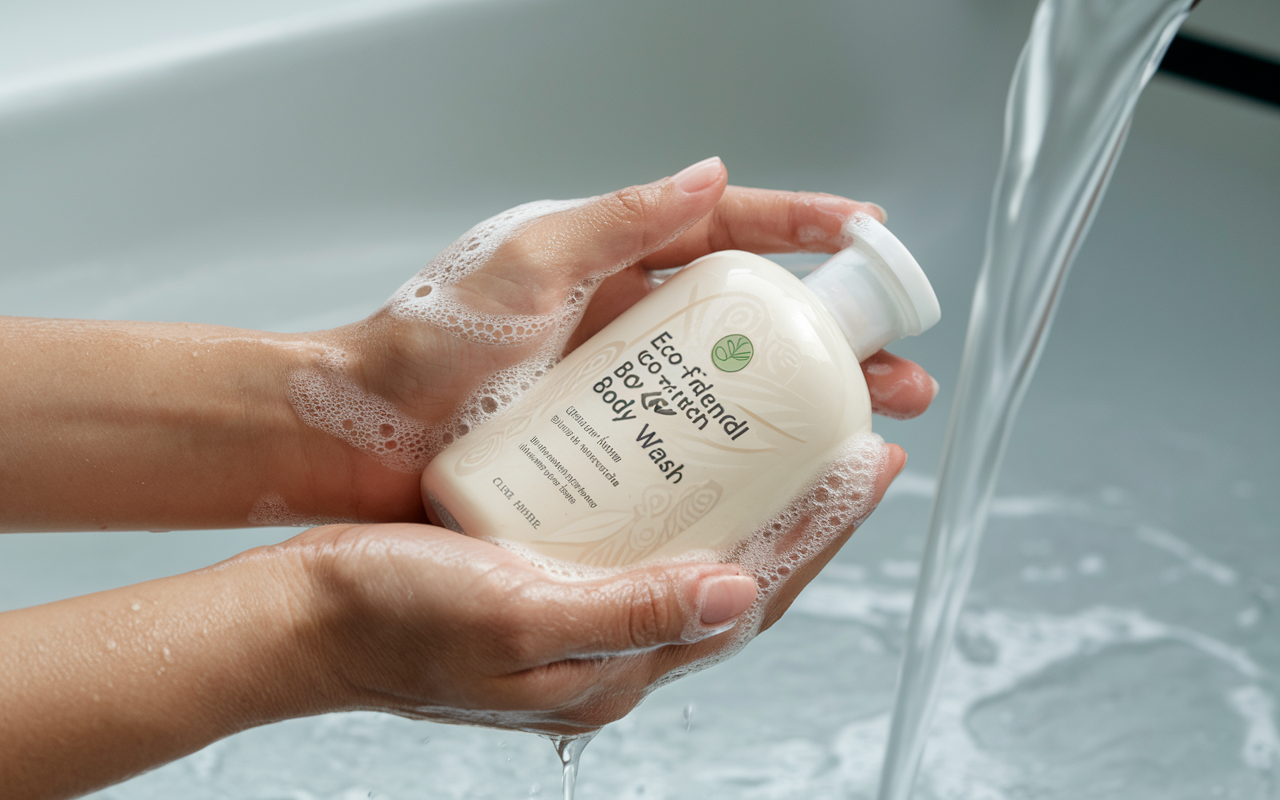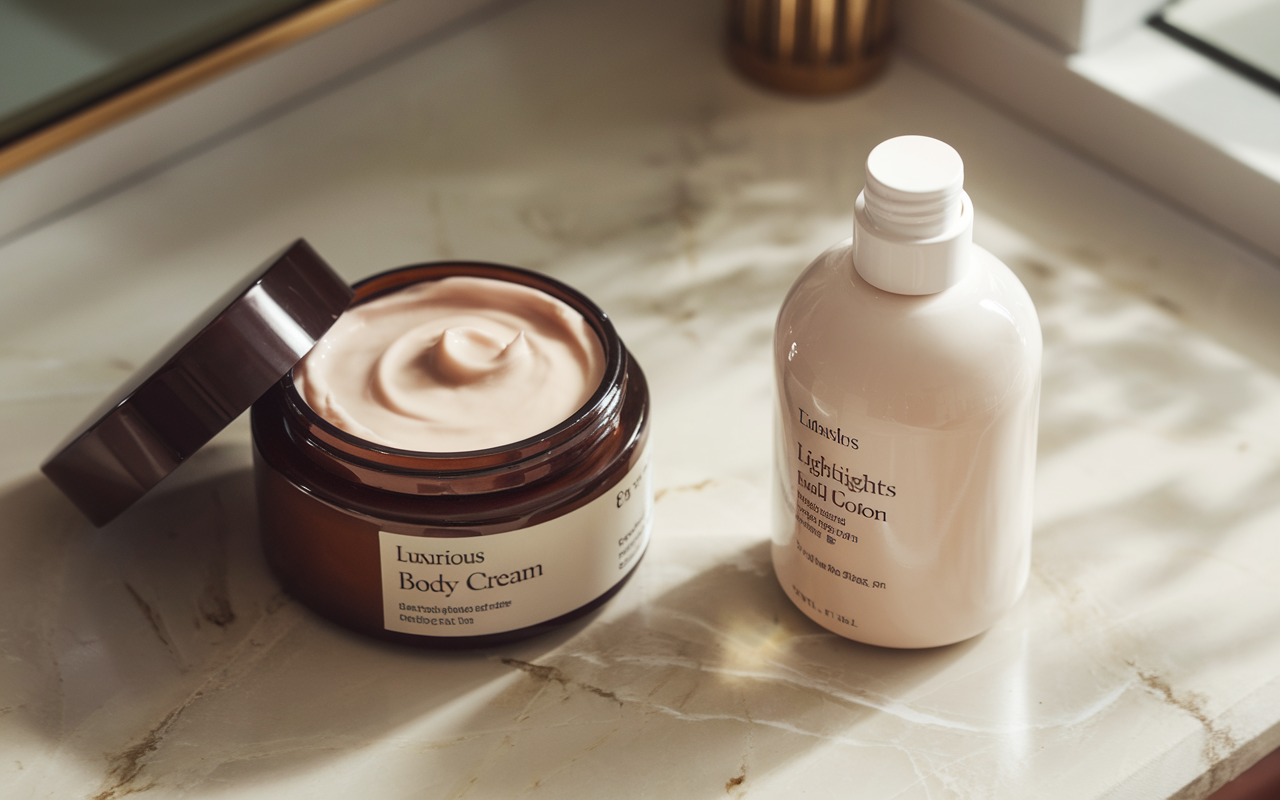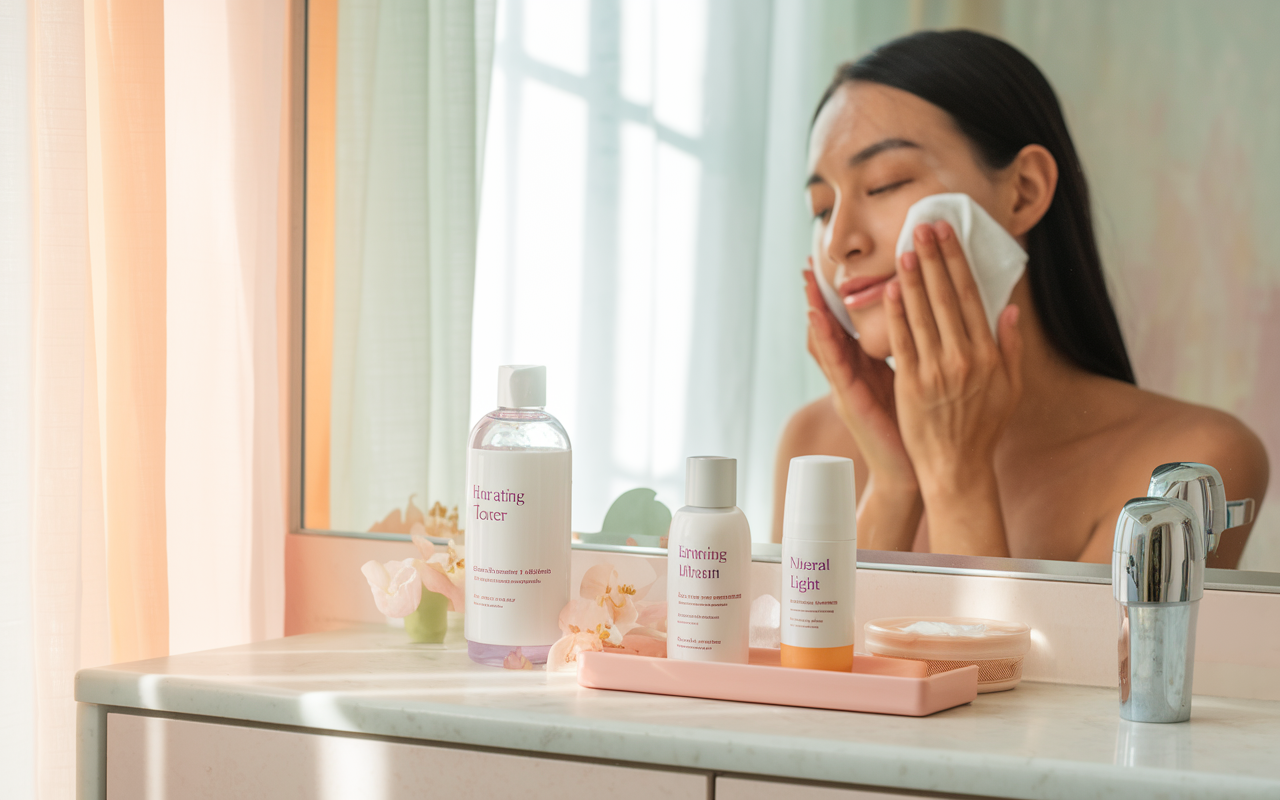
Introduction
Living with sensitive skin can feel like an ongoing battle, where even the most well-intentioned skin care products seem to betray you. It’s a journey of navigating flare-ups, avoiding irritants, and searching for that perfect skin care routine sensitive skin. But it doesn’t have to be this way forever. With the right knowledge and a tailored approach, you can transform your skin’s health and your relationship with it. This comprehensive guide will help you craft a skin care routine sensitive skin that not only soothes and protects but also empowers you to feel confident and comfortable in your skin.
What is Sensitive Skin?
Defining Sensitive Skin
Sensitive skin is not a one-size-fits-all condition. It’s an umbrella term for a variety of symptoms that indicate your skin is more reactive than most. This could mean your skin stings, burns, or becomes red and itchy in response to products or environmental factors. Understanding that sensitive skin is a spectrum helps us appreciate the unique needs of each person’s skin and the importance of a customized skin care routine sensitive skin.
Common Symptoms and How to Identify Sensitive Skin
If you have sensitive skin, you might experience symptoms like:
- Redness: Your skin turns red or pink more easily than others.
- Burning or Stinging: Skin care products or even water can cause discomfort.
- Dryness and Flakiness: Your skin feels tight, especially after cleansing.
- Pustules or Bumps: You might notice small, red bumps after using certain products.
Identifying sensitive skin often involves observing how your skin reacts to different stimuli and keeping track of these reactions over time. If you suspect you have sensitive skin, a dermatologist can provide a proper diagnosis and guide you toward an effective skin care routine sensitive skin.
Factors Contributing to Skin Sensitivity
Several factors can contribute to skin sensitivity:
- Genetics: Sensitivity can be hereditary. If your parents have sensitive skin, you might too.
- Environmental Elements: Cold weather, pollution, and sun exposure can exacerbate sensitivity.
- Skin care Products: Harsh chemicals, fragrances, and preservatives in skin care products can trigger reactions.
- Lifestyle Habits: Diet, stress, and sleep patterns also play a significant role in skin sensitivity.
The Importance of a Tailored Skin care Routine Sensitive Skin
Benefits of Having a Personalized Skin care Routine
A tailored skin care routine sensitive skin is essential because it addresses your unique skin needs. Unlike generic skin care routines, a personalized approach focuses on calming and protecting your skin from irritants while enhancing its natural barrier function. When you use products designed specifically for sensitive skin, you minimize the risk of adverse reactions and support your skin’s health and resilience.
The Impact of Using the Wrong Products on Sensitive Skin
Using the wrong products can be disastrous for sensitive skin. Harsh ingredients like alcohol, synthetic fragrances, and sulfates can strip your skin of its natural oils, leaving it vulnerable and more prone to irritation. A skin care routine sensitive skin must be gentle, nourishing, and free from common irritants to maintain skin health and comfort.
Building an Effective Skin care Routine Sensitive Skin
Crafting the perfect skin care routine sensitive skin involves choosing the right products and using them in the right order. Here’s a comprehensive guide to building your morning and evening routines.
Morning Routine: Essential Steps
- Gentle Cleansing: Start your day with a mild, fragrance-free cleanser that won’t strip your skin of its natural oils. Look for ingredients like glycerin or aloe vera, which clean without causing irritation.
- Hydrating Toner: A hydrating toner helps balance your skin’s pH and provides an extra layer of moisture. Choose alcohol-free formulas with soothing ingredients like chamomile or rose water.
- Lightweight Moisturizer: After toning, apply a lightweight moisturizer to lock in hydration. Opt for products containing ceramides or hyaluronic acid, which help maintain your skin’s moisture barrier.
- Sunscreen: Protecting your skin from UV rays is crucial, especially for sensitive skin. Choose a mineral-based sunscreen with zinc oxide or titanium dioxide, which are less likely to cause irritation.
Evening Routine: Repair and Rejuvenate
- Double Cleansing: If you wear makeup or sunscreen, double cleansing ensures all traces of product and impurities are removed. Start with an oil-based cleanser to dissolve makeup, followed by a gentle, water-based cleanser.
- Restorative Serums: At night, your skin goes into repair mode. Serums containing ingredients like niacinamide or peptides can help calm inflammation and strengthen your skin’s barrier.
- Nourishing Night Cream: A rich night cream can provide extra hydration and support your skin’s overnight repair processes. Look for products with ingredients like shea butter or squalane.
- Overnight Treatments for Sensitive Skin: For added benefits, consider using overnight masks or treatments designed for sensitive skin. These products offer intensive hydration and help soothe irritated skin while you sleep.
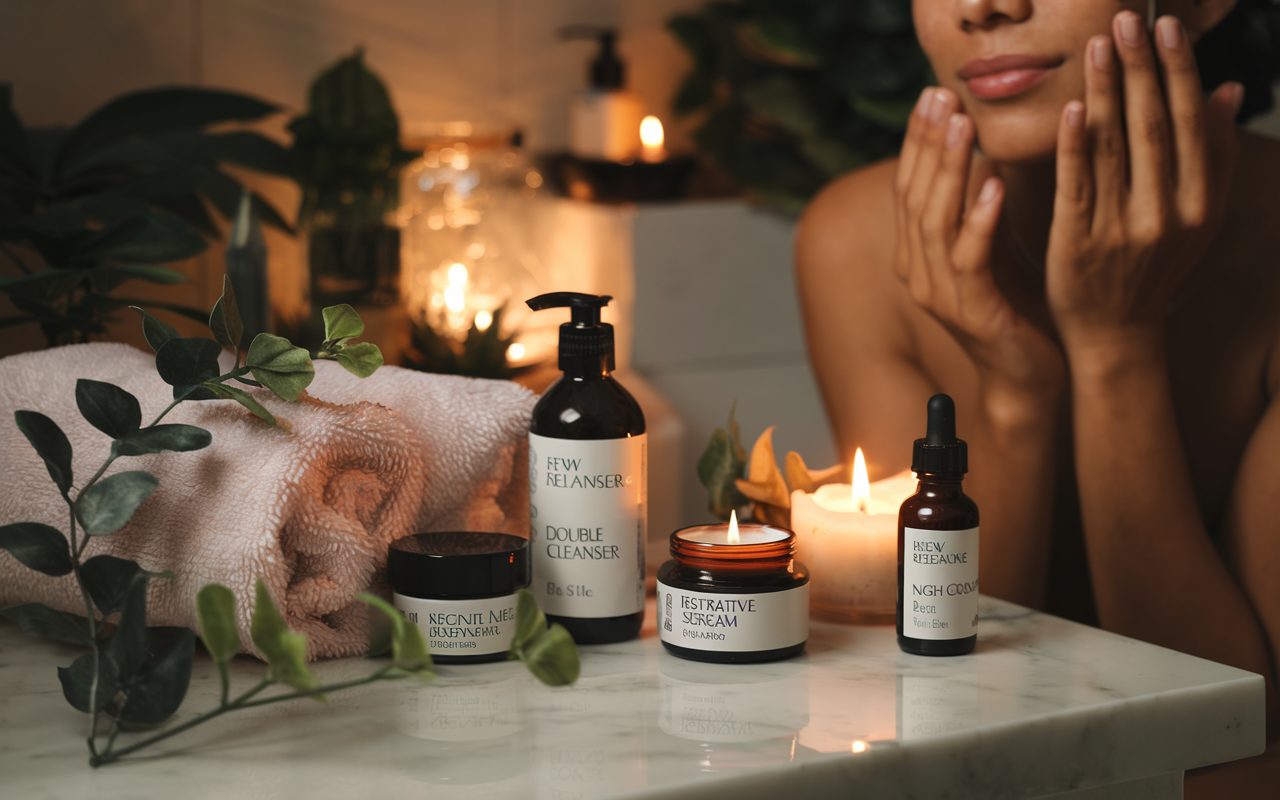
Choosing the Right Products for Your Skin care Routine Sensitive Skin
Understanding Product Labels
Navigating the world of skin care products can be overwhelming, especially when you have sensitive skin. Understanding product labels is crucial to building an effective skin care routine sensitive skin. Look for terms like “hypoallergenic,” “fragrance-free,” and “non-comedogenic,” which indicate the product is less likely to irritate or clog pores.
Ingredients to Seek Out
For sensitive skin, ingredients that soothe, hydrate, and protect are essential. Look for:
- Aloe Vera: Known for its soothing properties, aloe vera helps calm irritated skin.
- Ceramides: These lipids help restore the skin barrier and retain moisture.
- Hyaluronic Acid: A hydrating powerhouse that attracts and retains moisture in the skin.
- Colloidal Oatmeal: This ingredient is excellent for soothing and calming inflamed skin.
Ingredients to Avoid
Certain ingredients can exacerbate sensitivity and should be avoided in a skin care routine sensitive skin:
- Alcohol: Can be drying and irritating.
- Fragrances: Both synthetic and natural fragrances can trigger allergic reactions.
- Essential Oils: While natural, some essential oils can be too potent for sensitive skin.
- Sulfates: Harsh cleansing agents that can strip your skin of its natural oils.
The Importance of Patch Testing
Before introducing a new product into your skin care routine sensitive skin, always perform a patch test. Apply a small amount of the product to an inconspicuous area of skin, such as behind your ear or on your inner arm. Wait 24-48 hours to see if any irritation or reaction occurs. This simple step can save your skin from potential discomfort and prevent the need to overhaul your routine.

Natural and DIY Remedies for Sensitive Skin
Benefits of Natural Skin care
Natural skin care products are often perceived as gentler and more suitable for sensitive skin because they contain fewer synthetic chemicals and potential irritants. Ingredients like chamomile, calendula, and green tea offer calming properties that can benefit sensitive skin when included in a skin care routine sensitive skin.
Simple DIY Recipes for a Skin care Routine Sensitive Skin
Creating your own skin care products allows you to control the ingredients and avoid irritants. Here are a few simple DIY recipes for sensitive skin:
- Oatmeal Honey Mask: Combine ground oatmeal with honey to create a soothing mask that calms irritation and moisturizes the skin. Apply for 10-15 minutes and rinse with lukewarm water.
- Aloe Vera Gel: Pure aloe vera gel can be used as a lightweight moisturizer or soothing treatment. Apply a thin layer to clean skin and let it absorb.
- Green Tea Facial Mist: Brew green tea, let it cool, and pour it into a spray bottle. Use it as a refreshing and antioxidant-rich facial mist throughout the day.
Precautions with DIY Skin care
While DIY skin care can be beneficial, it’s important to exercise caution. Not all natural ingredients are suitable for sensitive skin. Always perform a patch test and avoid using ingredients that you know can trigger reactions.
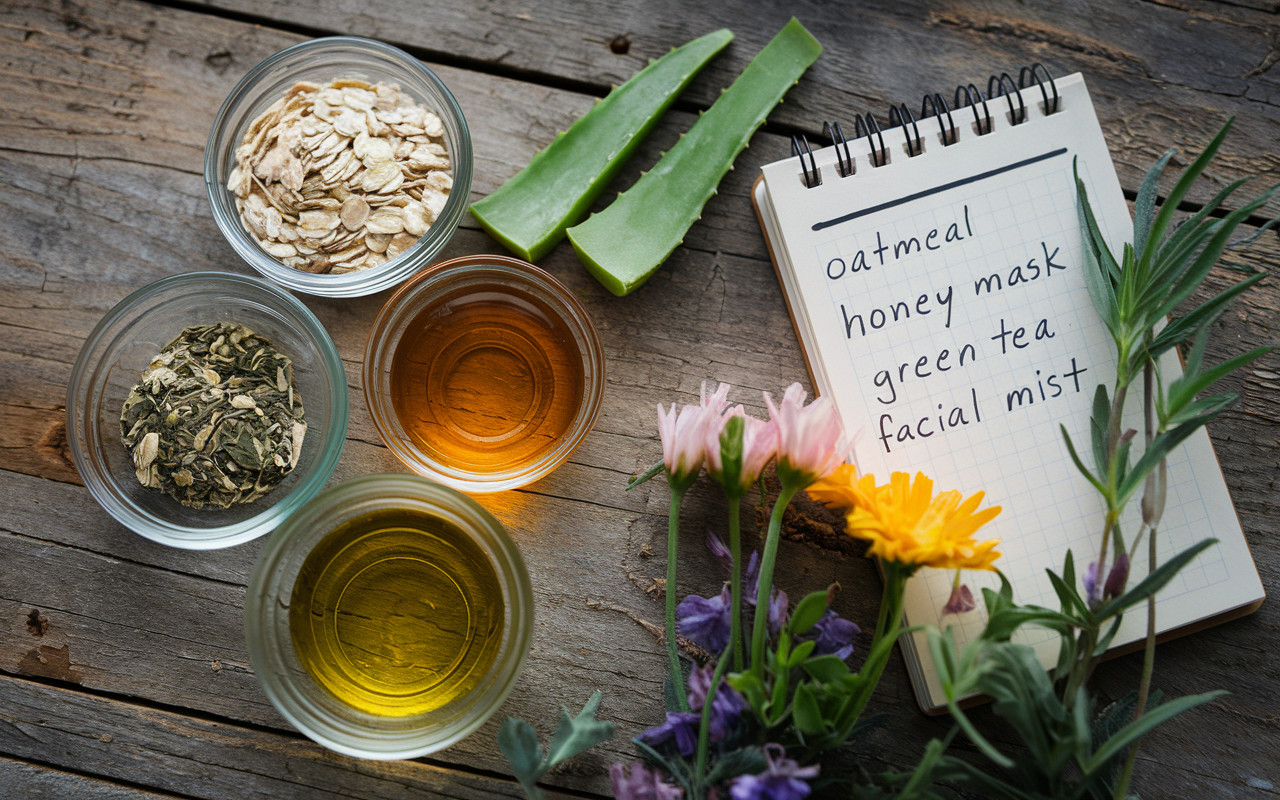
Lifestyle Changes to Support Your Skin care Routine Sensitive Skin
Diet and Its Impact on Skin Health
What you eat can have a significant impact on your skin. For sensitive skin, a diet rich in anti-inflammatory foods like fruits, vegetables, nuts, and seeds can help reduce inflammation and promote skin health. Omega-3 fatty acids, found in fish like salmon and in flaxseeds, are particularly beneficial for maintaining a healthy skin barrier.
The Importance of Hydration
Staying hydrated is crucial for all skin types, but especially for sensitive skin. Drinking enough water helps keep your skin hydrated from within, which can reduce dryness and irritation. Aim for at least 8 glasses of water a day to support your skin care routine sensitive skin.
Managing Stress to Prevent Flare-Ups
Stress is a common trigger for sensitive skin flare-ups. Finding ways to manage stress, such as practicing mindfulness, yoga, or meditation, can help keep your skin calm and clear. Incorporating stress-relieving activities into your daily routine can complement your skin care routine sensitive skin and contribute to overall skin health.
Sleep’s Role in Skin Recovery
Quality sleep is essential for skin repair and regeneration. During sleep, your skin goes through a renewal process, making it crucial to get 7-9 hours of restful sleep each night. Establishing a consistent sleep schedule and creating a relaxing bedtime routine can enhance the effectiveness of your skin care routine sensitive skin.
Common Mistakes in a Skin care Routine Sensitive Skin
Over-Exfoliating and Its Dangers
Exfoliating can be beneficial for removing dead skin cells, but over-exfoliating can damage the skin barrier and exacerbate sensitivity. For sensitive skin, it’s best to exfoliate no more than once a week with a gentle exfoliant that does not contain harsh scrubbing particles or strong acids.
Ignoring Product Labels
Not paying attention to product labels is a common mistake in a skin care routine sensitive skin. Always check for potential irritants like alcohol, fragrance, and sulfates. Reading the ingredient list thoroughly helps you avoid products that could trigger a reaction.
Skipping Sunscreen
Sunscreen is a non-negotiable step in any skin care routine, including for sensitive skin. UV rays can cause damage even on cloudy days, leading to increased sensitivity and irritation. Make sure to apply a broad-spectrum sunscreen every morning and reapply throughout the day if you’re outdoors.
Not Adapting the Routine to Seasonal Changes
Your skin’s needs can change with the seasons. During the winter, your skin might require a richer moisturizer, while in the summer, a lighter, non-comedogenic formula might be more suitable. Adjusting your skin care routine sensitive skin according to seasonal changes helps maintain your skin’s health and balance year-round.
How to Handle Flare-Ups in Your Skin care Routine Sensitive Skin
Immediate Steps to Soothe Irritation
If you experience a flare-up, immediately stop using any new products and switch to a basic routine of cleansing, moisturizing, and protecting with sunscreen. Applying a cold compress or using a soothing mask like an oatmeal or aloe vera mask can help calm irritated skin.
Long-Term Strategies to Prevent Future Flare-Ups
To prevent future flare-ups, keep your skin care routine sensitive skin simple and consistent. Avoid introducing multiple new products at once and maintain a healthy lifestyle with a balanced diet, adequate hydration, stress management, and sufficient sleep.
Consulting with a Dermatologist
If you continue to experience frequent flare-ups, it might be time to consult a dermatologist. They can help identify potential triggers, recommend suitable products, and create a more tailored skin care routine sensitive skin.
Psychological Aspects of Managing Sensitive Skin
The Emotional Toll of Dealing with Sensitive Skin
Living with sensitive skin can be emotionally challenging. The unpredictability of flare-ups and the frustration of finding the right products can lead to feelings of insecurity and self-consciousness. Recognizing these feelings and seeking support, whether from friends, family, or a skin care community, can make a significant difference.
Building Confidence Through Skin care
Developing a skin care routine sensitive skin that works for you can be empowering. Taking the time to care for your skin and seeing positive results can boost your self-esteem and help you feel more confident in your own skin.
Finding Support in the Skin care Community
There are many online communities and forums where people with sensitive skin share their experiences, tips, and product recommendations. Joining these communities can provide valuable insights and emotional support, helping you navigate your skin care journey with more confidence.
Case Studies: Real Stories of Skin care Routines for Sensitive Skin
Success Stories of Personalized Routines
Many people have found success by developing personalized skin care routines for sensitive skin. For example, Sarah, who struggled with redness and irritation for years, discovered that switching to a fragrance-free, minimalistic routine with gentle cleansers and moisturizers made a significant difference.
Lessons Learned from Skin care Mistakes
Others have learned valuable lessons from their skin care mistakes. John, who tried using multiple new products at once, experienced a severe flare-up. He learned the importance of introducing new products slowly and performing patch tests.
Tips from People with Sensitive Skin
People with sensitive skin often have great tips to share. Here are a few:
- Stick to the Basics: Avoid overloading your skin with too many products.
- Listen to Your Skin: Pay attention to how your skin reacts and adjust your routine accordingly.
- Patience is Key: Finding the right skin care routine sensitive skin takes time, so be patient and persistent.
Conclusion
Developing a skin care routine sensitive skin requires patience, understanding, and careful consideration of the products you use. By choosing gentle, hydrating, and non-irritating products, avoiding known triggers, and making healthy lifestyle choices, you can create a routine that soothes, protects, and enhances your skin’s natural beauty. Remember, your skin is unique, and embracing its sensitivity with the right care can lead to healthier, happier skin that you feel good in.
FAQs
Q: How often should I adjust my skin care routine sensitive skin?
A: It’s best to adjust your skin care routine sensitive skin only when necessary, such as when you notice changes in your skin’s condition or with seasonal changes. Otherwise, consistency is key to maintaining healthy skin.
Q: Are fragrance-free products always safe for sensitive skin?
A: While fragrance-free products are often better for sensitive skin, it’s still important to check the ingredient list for other potential irritants. Not all fragrance-free products are formulated specifically for sensitive skin.
Q: Can diet alone improve my sensitive skin?
A: While diet plays a role in overall skin health, it’s unlikely that diet alone can completely resolve sensitive skin issues. A holistic approach, including a proper skin care routine sensitive skin, is usually most effective.
Q: Is sensitive skin hereditary?
A: Sensitive skin can be hereditary, but environmental factors and lifestyle choices also play significant roles. If you have a family history of sensitive skin, you may be more prone to it.
Q: Can I wear makeup with sensitive skin?
A: Yes, you can wear makeup with sensitive skin, but it’s essential to choose products that are hypoallergenic, non-comedogenic, and free of fragrances. Always perform a patch test before using new makeup products.
Also Visit:
Understanding Kids Skin Care 2024 – Nurturing Young Skin with Love and Care
Ultimate Guide 2024 – Skin Care Do I Wash Away Toner?
The Transformative Power of Essence Skin Care 2024 – Your Path to Radiant, Glowing Skin

